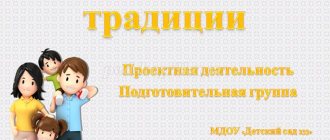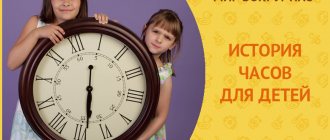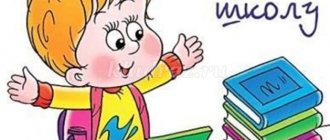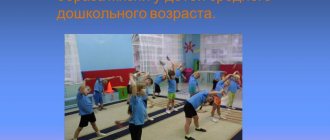Traditions in a kindergarten group
Traditions in a kindergarten group
Folk traditions have existed since time immemorial. Over time, with the development of society, traditions expand, change, some are forgotten, and some, on the contrary, become firmly established in our lives. There are family traditions, corporate traditions, there are traditions that belong to one group, but whatever the traditions are, they are all aimed at uniting people, the desire of people to unite and somehow diversify their lives, decorate them emotionally, bring some positive moments associated with a significant event, with the memory of good deeds. There are traditions in raising children. Basically, these are traditions specific to one particular family. And first of all, in the mind of a small child, the traditions of relationships that exist in the family between parents are deposited; the child develops tastes and habits similar to adults long before the process of realizing what is happening begins. After all, children’s behavior follows the principle of copying.
As the child grows up, he comes to kindergarten and his behavior becomes more conscious. Finding himself in a new environment, a child learns new patterns of behavior and masters forms of human relationships that are new to him. The child begins to develop moral qualities, aspirations, and ideals. And this formation is greatly facilitated by those sometimes unique traditions that exist not only in kindergarten, but specifically in each kindergarten group. Each such tradition is aimed primarily at uniting the team. And if the teachers in the group adhere to a humane approach to children, where each child is an individual, and everyone together is a friendly team, then it is traditions that help the child master the values of the team, promote a sense of belonging to a community of people, teach them to predict the development of events and choose methods of action. Therefore, creating group traditions in kindergarten and passing them on to the next generation of students is necessary and necessary work. Traditions play a big role in strengthening friendly relations and provide great assistance in raising children. Traditions in which children directly participate together and with the teacher are firmly embedded in children’s memory and are already inextricably linked with childhood, with the memory of kindergarten as a common home, where every child is loved and respected. Our group has already firmly established traditions that have found a response in the hearts of more than one generation of students. These traditions are accepted with great pleasure by children and parents, improved and multiplied. Each tradition is aimed at achieving a specific educational goal. Each tradition is time-tested.
So, I will present to your attention the traditions of our group:
- "Morning of joyful meetings." Goal: To ensure the child’s gradual integration into the rhythm of group life, to create a good mood, and to set up friendly communication with peers.
- "Celebrating a birthday." Goal: To develop the ability to empathize with joyful events, to evoke positive emotions, to emphasize the importance of each child in the group.
- "Excursion to school." Goal: To prepare children to enter the “world of school”, to form psychological readiness for schooling.
- "Family Workshop" Goal: Involving children and parents in joint creativity, in order to establish a friendly atmosphere in the family and expand children’s knowledge about their loved ones.
- "Dear memory." Goal: To make children proud of their country and their people, to cultivate patriotic feelings.
- "We're going to the museum." Goal: To arouse in children a desire to know the history of their people, to introduce them to the world of beauty, and to form an aesthetically developed personality.
- "Let's decorate our garden with flowers." Goal: To arouse in children a desire to help adults, involve them in feasible work, and cultivate a love for nature.
- "Clean Friday" Goal: To instill in children respect for work, to instill joy in participating in common work.
- "We are always together". Goal: Formation of friendly and friendly relations between children.
Holidays that we traditionally celebrate in the group.
- "Knowledge Day" (September 1)
- "Osenins"
- "Teacher's Day" (September 27)
- "Mother's Day" (November 27)
- "New Year"
- "Defender of the Fatherland Day" (February 23)
- "Maslenitsa"
- "International Women's Day March 8"
- "April Fool's Day" (April 1)
- “Cosmonautics Day” (April 12)
- "International Earth Day" (April 22)
- "Easter"
- "Labor Day" (May 1)
- "Victory Day" (May 9)
- "International Children's Day"
“The origin of preschool educational institution traditions - as a means of developing the creative potential of preschool children”
The origin of preschool educational institution traditions - as a means of developing the creative potential of preschool children
What is kindergarten
This is a home for all the guys
Because there is harmony in it
We live as one family!
Our kindergarten works in the priority direction - the artistic and aesthetic development of pupils, therefore, it is relevant for us to solve problems aimed at organizing the artistic and creative activities of preschool children, which is currently considered as significant from the point of view of personal development, its creative initiative, independence, formation of a world of personal meanings and practical experience.
A kindergarten is a second home for children, and every home, every family necessarily has its own traditions. So in our kindergarten “Golden Key” there are well-established traditions that are directly aimed at developing creativity in children.
Preschool age is a favorable period for the development of creativity. It is at this time that progressive changes occur in many areas, mental processes are improved (attention, memory, perception, thinking, speech, imagination, personal qualities are actively developing, and on their basis - abilities and inclinations. The more diverse the children’s activities, the more successful the diversification is. development of the child’s personality, his potential capabilities and first manifestations of creativity are realized.
The more stable the traditions, the more valuable any institution is. The presence of traditional events, holidays, activities in kindergarten is an integral part in the activities of a preschool institution, since it helps to increase the efficiency of the educational process and creates comfortable conditions for the formation of the personality of each child. Traditions are aimed, first of all, at uniting the team of children, parents and kindergarten teachers; they play a big role in the formation and strengthening of friendly relations between all participants in educational relations. Traditions help the child to master the values of the team, promote a sense of belonging to a community of people, teach them to predict the development of events and choose courses of action. Therefore, creating traditions in kindergarten and passing them on to the next generation of students is necessary and necessary work. Traditions in which children directly participate together with their parents and teacher are firmly embedded in children’s memory and are already inextricably linked with childhood, with the memory of kindergarten as a common home, where every child is loved and respected.
It has become a tradition of our preschool educational institution to hold drawing and craft competitions dedicated to various holidays. For example, we host competitions and exhibitions of family creativity on the topics: “Non-standard physical education equipment”, “Musical instruments with your own hands”, “Gifts from Santa Claus”, “Magic snowflake”, “My family tree”, “Family toy” and many others . To develop children's talent, we hold children's creativity competitions and personal exhibitions, both in group rooms and in the foyer of the kindergarten. A new tradition of the kindergarten has become holding competitions via the Internet on the website Odnoklassniki.ru in the group of our preschool educational institution, where everyone can vote for their favorite work. So they tried to hold a drawing competition “My mother is the best in the world.”
To develop the creative potential of pupils in our preschool educational institution, circle activities have been organized, which have an artistic and aesthetic orientation. Parents can see the results of the circles’ work through quarterly exhibitions and reporting concerts, which usually take place at general parent meetings.
To achieve the full development and upbringing of a preschooler, it is necessary to coordinate the efforts of the preschool educational institution and the family in which he is being raised. It has already become a tradition to hold open days for parents; joint holidays, we organize annual joint control with the parent community on various topics. This academic year there was a control over the organization and conduct of circle work. A certificate is written based on the results of each control. Based on it, we draw a conclusion and build a trajectory for our work.
One of the interesting forms of work in our kindergarten is the holding of an annual theater festival, in which groups of all ages participate, and parents are also involved. The theme of theater weeks can be timed to coincide with the celebration of various holidays. Initially, this tradition consisted of staging and showing a play by children in the preparatory group. Every year this tradition began to improve:
— age groups joined (children from 3 years old participated)
- parents joined (playing the role of the hero, voicing puppet characters, showing a puppet show),
- teachers joined (teachers stage a play and show it, demonstrating their acting skills, gaining experience in staging plays).
- prospects for further development - family theater.
Each group takes a responsible approach to preparing for the creative week.
(choose a production - think about the scenery, costumes - casting for the main roles is carried out - make a poster).
A serious, creative process reigns during this period in kindergarten. All specialists are “drawn” into the interesting world of the theater: musical director, physicist. instructor, teacher - speech therapist. Over the entire existence of the tradition, 23 productions of different genres have been shown
— puppet theater “Bi-ba-bo”,
- filmed cartoon,
- dramatization,
- video performance.
Each participant in the educational process is interested in high-quality, creative work and, as a result, incessant applause from the audience.
I bring to your attention a video announcing the past theater weeks.
Today we say with confidence that every child is born with innate creative abilities. But only those children whose upbringing conditions allowed them to develop these abilities in time grow up to be creative people. Every child is a creator by nature. As a rule, his creative potential is in a latent state and is not always fully realized. Preschool teachers create conditions that encourage children to discover their talents.
Creating traditions in kindergarten and passing them on to the next generation of students is necessary and necessary work. Traditions play a big role in strengthening friendly relations and provide great assistance in raising children. I believe that in our kindergarten there are already well-established traditions that have found a response in the hearts of more than one generation of pupils. These traditions are accepted with great pleasure by children and parents, improved and multiplied. Each tradition is aimed at achieving a specific educational goal. Each tradition is time-tested.



